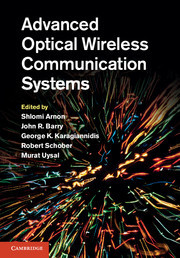Description
Advanced Optical Wireless Communication Systems
Coordinators: Arnon Shlomi, Barry John, Karagiannidis George, Schober Robert, Uysal Murat
Combines theory with real-world case studies to give a comprehensive overview of modern optical wireless technology.
Language: English
Subject for Advanced Optical Wireless Communication Systems:
Publication date: 05-2012
404 p. · 17.7x25.3 cm · Hardback
404 p. · 17.7x25.3 cm · Hardback
Description
/li>Contents
/li>Biography
/li>
Optical wireless communications is a dynamic area of research and development. Combining fundamental theory with a broad overview, this book is an ideal reference for anyone working in the field, as well as a valuable guide for self-study. It begins by describing important issues in optical wireless theory, including coding and modulation techniques for optical wireless, wireless optical CDMA communication systems, equalization and Markov chains in cloud channels and optical MIMO systems, as well as explaining key issues in information theory for optical wireless channels. The next section describes unique channels that could be found in optical wireless applications, such as NLOS UV atmospheric scattering channels, underwater communication links and a combination of hybrid RF/optical wireless systems. The final section describes applications of optical wireless technology, such as quantum encryption, visible light communication, IR links and sensor networks, with step-by-step guidelines to help reduce design time and cost.
Part I. Outlook: 1. Introduction Shlomi Arnon, John Barry, George Karagiannidis, Robert Schober and Murat Uysal; Part II. Optical Wireless Communication Theory: 2. Coded modulation techniques for optical wireless channels Ivan B. Djordjevic; 3. Wireless optical CDMA communication systems Jawad A. Salehi, Babak M. Ghaffari and Mehdi D. Matinfar; 4. Pointing error statistics Shlomi Arnon; 5. Equalization and Markov chains in cloud channel Mohsen Kavehrad; 6. Multiple-Input/Multiple-Output techniques for indoor optical wireless communications Steve Hranilovic; 7. Channel capacity Amos Lapidoth, Stefan M. Moser and Michèle Wigger; Part III. Unique Channels: 8. Modeling and characterization of ultraviolet scattering communication channels Haipeng Ding, Brian M. Sadler, Gang Chen and Zhengyuan Xu; 9. Free space optical communications underwater Brandon Cochenour and Linda Mullen; 10. The optical wireless channel Roger Green and Mark Leeson; 11. Hybrid RF/FSO communications Nick Letzepis and Albert Guillén i Fàbregas; Part IV. Applications: 12. Quantum key distribution R. Ursin, N. K. Langford and A. Poppe; 13. Optical modulating retro-reflectors William Rabinovich; 14. Visible-light communications Kang Tae-Gyu and John R. Barry; 15. Optical wireless in sensor networks Dominic C. O'Brien and Sashigaran Sivathasan.
Shlomi Arnon is an Associate Professor at the Department of Electrical and Computer Engineering at Ben-Gurion University (BGU), Israel and the Principal Investigator of Israel Partnership with NASA LUNAR Science Institute. In addition to research, Professor Arnon and his students work on many challenging engineering projects with emphasis on the humanitarian dimension, such as developing a system to detect human survival after earthquakes, or an infant respiration monitoring system to prevent cardiac arrest and apnea.
John R. Barry is a Professor of Telecommunications at the School of Electrical and Computer Engineering at the Georgia Institute of Technology. He is a co-author of Digital Communication (Kluwer, 2004) and Iterative Timing Recovery: A Per-Survivor Approach (VDM, 2009) and he is the author of Wireless Infrared Communications (Kluwer, 1994).
George K. Karagiannidis is an Associate Professor of Digital Communications Systems in the Electrical and Computer Engineering Department and Head of the Telecommunications Systems and Networks Laboratory at Aristotle University of Thessaloniki. He is co-recipient of the Best Paper Award of the Wireless Communications Symposium (WCS) in the IEEE International Conference on Communications (ICC'07).
Robert Schober is Professor and Canada Research Chair in Wireless Communications at the University of British Columbia (UBC), Vancouver, Canada. He has received numerous awards, including best paper awards from the German Information Technology Society (ITG), the European Association for Signal, Speech and Image Processing (EURASIP), IEEE ICUWB 2006, the International Zurich Seminar on Broadband Communications, and European Wireless 2000.
Murat Uysal is an Associate Professor at Özyeğin University, Istanbul, where he leads the Communication Theory and Technologies (CT and T) Research Group. Dr Uysal is the recipient of several awards including the Natural Science and Engineering Research Council of Canada (NSER
John R. Barry is a Professor of Telecommunications at the School of Electrical and Computer Engineering at the Georgia Institute of Technology. He is a co-author of Digital Communication (Kluwer, 2004) and Iterative Timing Recovery: A Per-Survivor Approach (VDM, 2009) and he is the author of Wireless Infrared Communications (Kluwer, 1994).
George K. Karagiannidis is an Associate Professor of Digital Communications Systems in the Electrical and Computer Engineering Department and Head of the Telecommunications Systems and Networks Laboratory at Aristotle University of Thessaloniki. He is co-recipient of the Best Paper Award of the Wireless Communications Symposium (WCS) in the IEEE International Conference on Communications (ICC'07).
Robert Schober is Professor and Canada Research Chair in Wireless Communications at the University of British Columbia (UBC), Vancouver, Canada. He has received numerous awards, including best paper awards from the German Information Technology Society (ITG), the European Association for Signal, Speech and Image Processing (EURASIP), IEEE ICUWB 2006, the International Zurich Seminar on Broadband Communications, and European Wireless 2000.
Murat Uysal is an Associate Professor at Özyeğin University, Istanbul, where he leads the Communication Theory and Technologies (CT and T) Research Group. Dr Uysal is the recipient of several awards including the Natural Science and Engineering Research Council of Canada (NSER
© 2024 LAVOISIER S.A.S.




